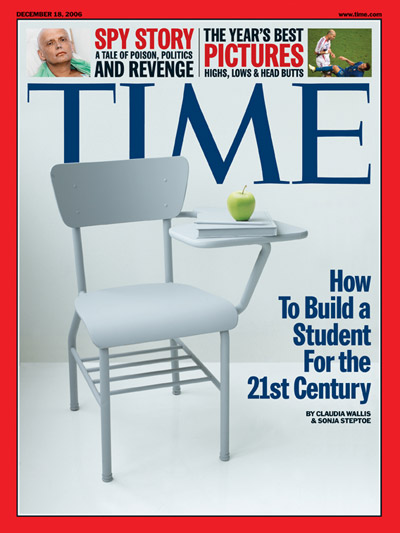 A recent Time article begins with a clever snapshot of Rip Van Winkle awaking from his 100 year nap to find himself immersed in unfamiliar technology, only to seek refuge in the one institution that has not appeared to change at all - a school.
A recent Time article begins with a clever snapshot of Rip Van Winkle awaking from his 100 year nap to find himself immersed in unfamiliar technology, only to seek refuge in the one institution that has not appeared to change at all - a school.The article was prompted by the New Commission on the Skills of the American Workforce's December 14th publication of its powerful recommendations for sweeping change in American education. Although there is apparent controversy with some of the bold proposals, the consensus of these educators and business folk is that "we need to bring what we teach and how we teach into the 21st century."
Time Magazine specifically highlights these four "21st century skills."
1. Knowing more about the world - As global citizens, students have an obligation to become aware of and sensitive to other geographies, cultures, and languages.
2. Thinking outside the box - Future job opportunities will focus on creativity and innovation, not rote or repetitive tasks. Time cites NCLB as one of the reasons schools have actually steered away from this goal in recent years. The need for more interdisciplinary curriculums is also stressed.
3. Becoming smarter about new sources of information - There is no question students can access more information that ever before. Educators must now facilitate skills in managing, validating, and interpreting that information.
4. Developing good people skills - Today, a person's EQ ("Emotional Intelligence") is even more important than their IQ. Traditional schooling can be competitive and individualistic, which does not bode well for tomorrow's collaborative workforce.
Learning 2.0
These goals are important and attainable. For example, we pioneered and do continue to focus on civil behavior, with our building specifically concentrating on the five domains of Emotional Intelligence.
1. Self-Awareness, 2. Self-Regulation, 3. Motivation. 4. Empathy, 5. Social Skills.
These qualities have been shown to directly impact students' academic learning, particularly among early adolescents
Our students know the vocabulary. They are used to referring to the domains when complementing other students or when discussing disciplinary infractions. A poster listing the five domains hangs in every classroom.
The need for updated literacy skills are as critical as social-emotional skills. NCREL's EnGauge website discusses the importance of this digital-age literacy as part of a necessary set of 21st century skills.
Systemic change takes time, but there are steps parents and educators can take. The Time article discusses curriki.org, a curriculum clearinghouse based on the wiki concept. NCREL has created a variety of frameworks (such as the the one below) that an educator can use to become more mindful of the integration of 21st century skills into current lesson plans and activities.

Educating these "21st century students" remains a daunting task in my mind. It is easy to get bogged down with the daily grind of the current public school system, however, I have to vow to not give up trying to address these goals of global awareness, innovative thinking, increased digital literacy, and social-emotional competencies. These skills are vitally important for our students.
Schools featured in the Time article include Seattle's John Stanford International School, Michigan's Henry Ford Academy, New York's Baccalaureate School for Global Education, and Michigan's Farmington High.
A great post at Learning.now highlights the irony of the Dec. 25th Time issue directly following this Dec. 18th article.
I find it fascinating how the article suggests that eventually projects like Curriki might “take the Web 2.0 revolution to school,” as if there aren’t countless educators working their butts off to demonstrate to their peers how blogs, podcasts, wikis and other tools can be used to improve student learning. It’s as if the amazing, transformative universe documented in the Person of the Year issue hasn’t even come knocking at education’s door yet. Or perhaps the industrial-era schoolhouse walls of are simply too thick for us to hear it knocking. Maybe it’s because too many educators and students who embrace Web 2.0 are finding themselves in conflict with a system that worries what might happen if students are given too many opportunities to express themselves online, whether at school or at home.

